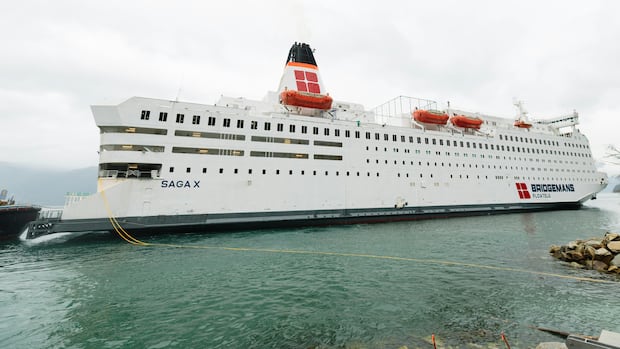British ColumbiaA second “floatel” ship has arrived near Squamish, B.C., preparing to house more than 640 Woodfibre LNG workers, the company said Thursday.Controversial worker housing for Woodfibre project will house more than 640 workers, company saysAkshay Kulkarni · CBC News · Posted: Nov 27, 2025 7:08 PM EST | Last Updated: 6 hours agoListen to this articleEstimated 3 minutesThe audio version of this article is generated by text-to-speech, a technology based on artificial intelligence.A second floating hotel, or ‘floatel,’ is seen preparing to host Woodfibre LNG workers near Squamish, B.C., in this handout picture. (Woodfibre LNG)A second “floatel” ship has arrived near Squamish, B.C., preparing to house more than 640 Woodfibre LNG workers, the company said Thursday.Earlier this year, Woodfibre LNG (WLNG) submitted an application to regulatory agencies for a second floating hotel to house workers, moored near the project site about seven kilometres outside Squamish.The approval of the first floatel was controversial — after the District of Squamish voted to deny Woodfibre the permit over concerns of women’s safety, waste management and other issues, B.C.’s Environmental Assessment Office stepped in and authorized the ship. Officials say the second floatel was approved with environmental, social, and cultural factors in mind.WATCH | Squamish residents divided over ‘floatel’ plan:Squamish residents divided over new “floatel” planMore than 250 Squamish residents packed into a local gym Tuesday night with a single purpose: to decide whether Squamish council should allow a cruise ship to house workers for an LNG plant being built near the community. As CBC’s David Ball reports from the public hearing, the small community is divided over the entire LNG project.In a Thursday statement, Woodfibre LNG said the MV Saga X ship will join the existing MV Isabelle X floating hotel, and both will remain in place until the project is fully built in 2027.”The floatel solution ensures the project’s expanding workforce does not compete for local housing, avoiding community impacts while maintaining a safe and well-managed work environment,” the company’s statement read.”The first floatel has been highly successful — both in minimizing local impacts and in providing a productive, well-supported accommodation solution.” A floatel being used to house construction workers is seen docked at the Woodfibre LNG export facility in June. (Darryl Dyck/The Canadian Press)The province’s Environmental Assessment Office (EAO) said that the two floatels, combined, would host around 1,300 construction workers.”The approval also includes the requirement for connection of the second floatel to [B.C.] Hydro power by June 2026 and until that time must adhere to new requirements for expanded air quality monitoring and reporting,” an EAO spokesperson said.”WLNG is also required to update its marine fish and fish habitat management plan and marine transportation management plan for construction.”A water taxi driver approaches the first floatel last May. (Darryl Dyck/The Canadian Press)Tracey Saxby, executive director of the My Sea to Sky advocacy group, said the approval of a second floatel exposed a “broken” regulatory regime in B.C. and Canada.”As a good corporate citizen, Woodfibre LNG could have invested in building legacy housing for Squamish that could help to relieve the current housing crisis,” she said in a statement. “Instead, Woodfibre LNG opted for a cheap, temporary solution that provides no legacy benefit to local communities, and puts its workers at risk.”Saxby said B.C.’s environmental assessment process was seeing communities pay the price while industry claims went unchallenged.A tugboat and water taxi are seen docked at a renovated cruise ship, known as the “floatel,” in May 2024. (Darryl Dyck/The Canadian Press)”Expanding liquefied natural gas won’t bring prosperity or energy security to people in Squamish or in [B.C.],” Saxby said. “Instead the costs associated with fossil fuel expansion are falling on everyday people in this province as profits flow to foreign-owned corporations.”With files from Tanya Fletcher, Tanushi Bhatnagar and The Canadian Press
2nd floating hotel arrives to house LNG workers near Squamish, B.C.











